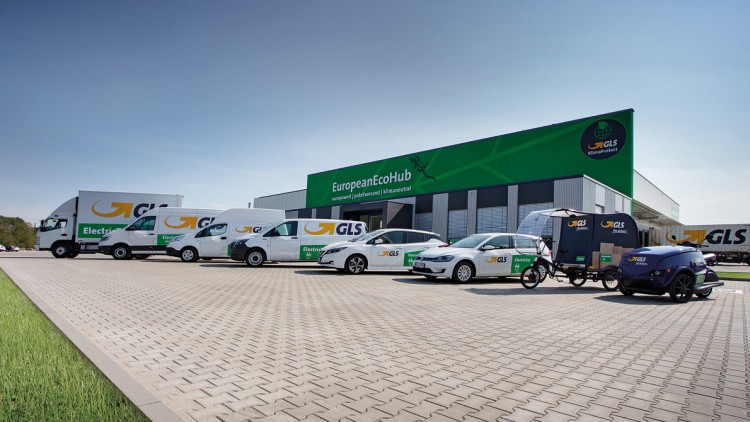- European hub as a strategic pillar of the international network
- Focus on sustainability and climate neutrality, e.g. via self-sufficient power supply
- Building investments of around 15 million euros
- Extension of capacity to up to 200,000 parcels per day
- 250 to 300 new work places already at the start
Neuenstein, 29 September 2020. Yesterday GLS connected the new EuropeanEcoHub in Essen to the network – in the presence of Prof. Dr. Andreas Pinkwart, Minister for Economic Affairs, Innovation, Digitalisation and Energy of the Federal State of North Rhine-Westphalia. The Hub can currently handle up to 75,000 shipments per day. The operation is sustainable: the photovoltaic and battery storage system is already designed for predominantly self-sufficient parcel production and the delivery in Essen will be emission-free by the end of next year.
European hub, autarchic electricity supply, emission-free delivery and a biotope for species requiring protection: "This location sets completely new standards within the framework of our GLS KlimaProtect programme – especially with regard to sustainable operation," explains Dr. Karl Pfaff, Chairman of the Management Board of GLS Germany. "At the same time, Essen is an important pillar in the regional and international GLS network". The GLS building investment totals about 15 million euros. At the beginning 250 to 300 workplaces will be created in Essen – about 165 will be GLS employees and over 100 will be created via GLS transport partners.
Regional and international
Germany's second largest location is an important pillar for the expansion of capacity in the Ruhr region. In its European hub function, Essen also acts as an international gateway –especially between Germany and the Benelux countries. In the first construction phase, a handling hall of approximately 8,500 square metres was built on the 53,000 square metre site in Essen-Bergeborbeck. Thanks to the latest conveyor technology and over 155 gates for loading and unloading, up to 75,000 parcels can already be handled daily. In a second expansion stage, GLS will be able to handle up to 200,000 parcels per day from the 30 unloading, 95 loading and 210 delivery gates.
Sustainable and self-sufficient
"By creating increasingly closed resource cycles for electricity, water and air, we have achieved three innovative milestones in the operation of a sustainable logistics location that go far beyond our previous environmental solutions," adds Gero Liebig, GLS Region Manager West.
The three innovative milestones in concrete terms:
- There are 880 high performance photovoltaic modules installed on the roof of the hall, which produce an output of 300 KWp or 286 MWh per year. A battery storage in a 20-foot container ensures depot operation and the supply of the charging infrastructure for e-vehicles even without sunlight. The system is already designed to operate the parcel production facility 160 days a year independently of the Essen power suppliers.
- In addition to covering the internal water consumption, the rainwater utilisation system has other ecologically valuable applications like supplying the 1,800 square meter green roof and, in particular, ensuring consistent water levels in the newt ponds.
- The same applies to our proven heat pump technology, which can now use "green electricity" to cool down the air in the halls by up to 4 degrees in a climate-neutral manner during the increasingly hot summer months to improve working conditions.
"Our European-wide parcel service should not only be of high quality, but also sustainable. That is why we are constantly testing and implementing new resource-saving and climate-neutral solutions throughout Europe," says Dr. Karl Pfaff. "The new EuropeanEcoHub in Essen therefore has a model character for the entire Group".
By the end of next year, GLS will have over 20 electric vehicles in use in Essen. In addition, charging points are available for the vehicles of employees, transport partners and their delivery drivers and visitors.
Biodiversity and protection of species
There is also a large biotope on the area: on 4,875 square metres of land, GLS sustainably operates professionally designed pond facilities and various land habitats for six species of newts, toads and frogs requiring protection. The 3,500 animals were collected by experts over several months before construction work began and have now found their new, ideal habitat, safely separated from the operating area by special fencing.
